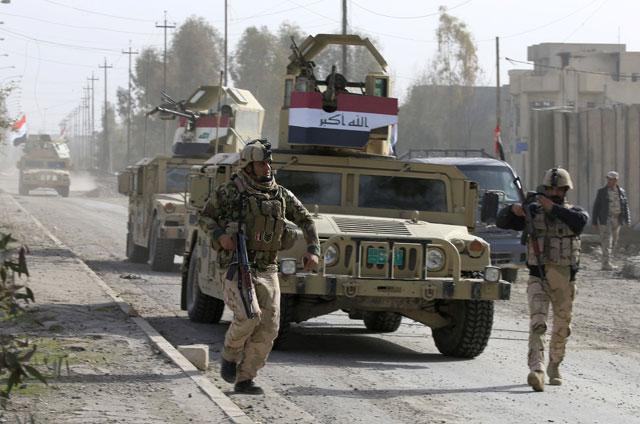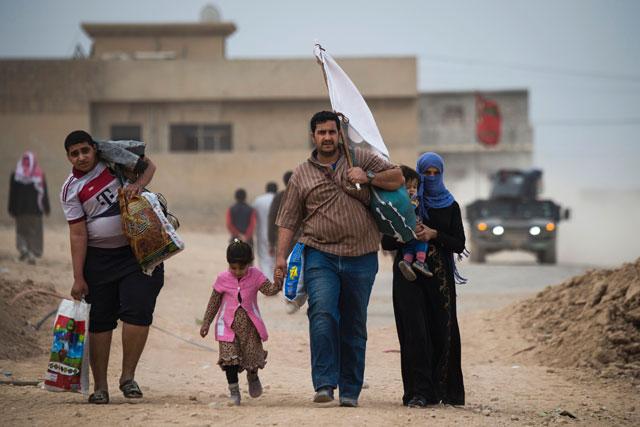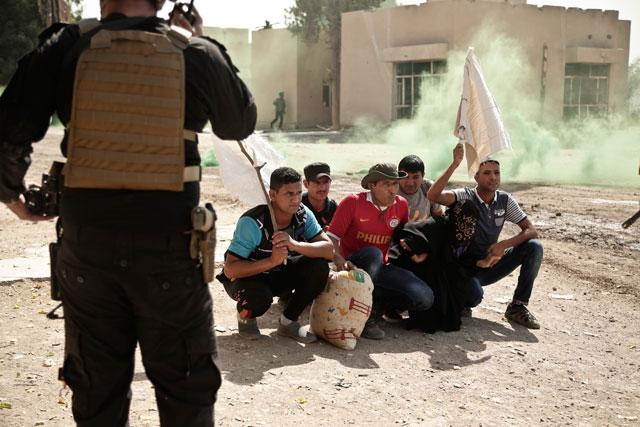You are here
Iraqi forces advance in Mosul but civilian toll mounts
By Reuters - Jan 11,2017 - Last updated at Jan 11,2017

Iraqi soldiers run during a battle against Daesh militants in the Wahda district of eastern Mosul, Iraq, on Tuesday (Reuters photo)
ERBIL /BAGHDAD — Iraqi forces pushed Daesh militants back further in Mosul on Tuesday in a renewed effort to seize the northern city and deal a decisive blow to the militant group, though progress was slower in some districts, the army said.
Iraqi forces and their allies have captured villages and towns surrounding Mosul and seized at least two-thirds of its eastern districts, military officials say, pushing right up to the eastern bank of the Tigris River in recent days.
But the government had initially hoped to retake Mosul by the end of 2016 and three months into the US-backed campaign, the militants still control all the territory to the west of the Tigris that bisects the city from north to south.
Wounded civilians streamed into nearby hospitals and Iraqi forces blamed Daesh for shooting at fleeing residents and shelling populated areas after losing control of them.
United Nations humanitarian spokesman Jens Laerke said nearly 700 people had been taken to hospitals in Kurdish-controlled areas outside Mosul in the last week and more than 817 had required hospital treatment a week earlier.
"Trauma casualties remain extremely high, particularly near frontlines," he told reporters in Geneva.
Recapturing Mosul after more than two years of Daesh rule would probably spell the end of the Iraqi side of the group's self-declared caliphate, which spans Iraq and Syria.
But advances inside Mosul slowed in November and December as troops engaged in tough urban warfare with the militants, who are thought to number several thousand inside the city.
The militants have fought back with suicide car bombs and snipers hidden among the civilian population. They have also blown up bridges crossing the Tigris to try to slow the Iraqi advance, military officials say.
Iraqi Prime Minister Haider Al Abadi said in December it would now take another three months to retake Mosul, the largest city under Daesh control in Iraq or Syria.
Bridges blown
Elite forces in the city’s east and northeast have advanced faster since the turn of the year thanks to new tactics and better coordination but there was stiff resistance in the southeast of Mosul, military officials said.
Lt. Colonel Abbas Al Azawi, a spokesman for the Iraqi army’s 16th division, said Iraqi forces entered Hadba on Tuesday, a large northeastern district, though it would likely take more than a day to capture and Daesh was deploying suicide bombers.
Elite Iraqi counter-terrorism service (CTS) units encircled the nearby Sukkar district on Monday and sought to recapture the strategic Mosul University area.
The United Nations has said Daesh seized nuclear material used for scientific research there when the militant group overran a third of Iraq in 2014.
The CTS and army units want to capture all the eastern bank of the Tigris so they can launch operations to retake western Mosul. An army statement and the US coalition said Daesh had blown up sections of two bridges linking east and west Mosul in a bid to hamper crossings by Iraqi forces.
Mosul’s five bridges across the Tigris had already been partially damaged by US-led air strikes to slow the militants’ movement. Coalition spokesman US Air Force Colonel John Dorrian told Reuters last week the new damage done by retreating IS fighters was “severe” but would not stop the advance.
“Every day the Iraqi Security Forces go forward and every day the enemy goes backward or underground,” he told reporters in Erbil in Iraq’s autonomous Kurdish region.
Human shields
Fighting in neighbourhoods in the southeast of Mosul has been tougher, however, as Iraqi forces push towards the river.
“The challenge is that they [Daesh] are hiding among civilian families, that’s why our advances are slow and very cautious,” Lieutenant-Colonel Abdel Amir Al Mohammedawi, a spokesman for the rapid response units of Iraq’s federal police, told Reuters.
He said police and army units had fought their way into the Palestine and Sumer districts over the last day but Daesh fighters were firing at civilians trying to flee.
“The families, when they see Iraqi forces coming, flee from the areas controlled by Daesh towards the Iraqi forces, holding up white flags, and Daesh bomb them with mortars and Molotov cocktails, and also shoot at them.
“Whenever they withdraw from a district, they shell it at random, and it’s heavy shelling,” he said.
Dorrian said militant fighters were hiding in mosques, schools and hospitals, using civilians as human shields.
One resident reached by phone in a recently recaptured district of Mosul said shells had continued to fall near his home, forcing him to move his family to another neighbourhood.
“In the 10 days since we were liberated, the bombs haven’t stopped. Shells fall every day near the house and we’ve seen civilians killed and wounded several times,” he said, without giving his name.
Another resident said he had heard an Daesh radio broadcast urging fighters to fire at areas were the population had stayed once the army moved in.
The number of people driven out of their homes by fighting spiked around the beginning of the new push by Iraqi forces, but has since returned to previous levels, the UN’s Laerke said.
Since the offensive started in October, some 135,000 people have been displaced, he said, adding that a non-governmental organisation had opened a field hospital east of Mosul to take the strain off hospitals in Erbil, some 60km away.
In a sign Baghdad is keen to revive parts of its economy hit by Daesh’s expansion more than two years ago, the oil ministry said this week it might resume exports via a pipeline to Turkey through Nineveh province, where Mosul is located.
It also invited an Angolan oil company to start work at two oil fields close to Mosul, which Daesh withdrew from months ago, setting oil wells alight as they left.
Related Articles
MOSUL — Hundreds of Iraqi civilians spilled into the streets Tuesday in eastern Mosul areas recently retaken from the Daesh terror group to
WARDAK, Iraq — Kurdish peshmerga forces launched a fresh attack on Daesh militants early on Sunday as part of a campaign to capture Mosul, t
BAGHDAD — The United Nations said on Tuesday it is "racing against the clock" to prepare emergency aid for hundreds of thousands of civilian
















